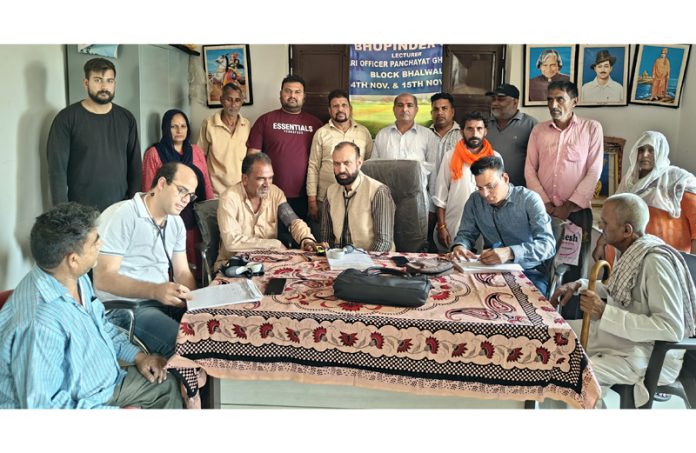Excelsior Correspondent
JAMMU, June 2: With temperatures roaring high much above the expected levels this year and increasing burden of cardiovascular diseases, Head Department of Cardiology GMCH Jammu Dr Sushil Sharma held a day long cardiac awareness-cum-health check up camp at Panchayat Gharota Lower Block Bhalwal, Jammu with main focus on the ways to reduce cardiac mortality due to heat exhaustion and adopt lifestyle measures conducive for healthy heart.
While interacting with the people, Dr Sushil stated that extreme heat affects human health, and rising temperatures will probably have adverse consequences as the climate changes. High temperature, among the well-documented effects of climate change on human health, has been included as a risk factor in the global burden of diseases. Unusually high temperatures can exacerbate existing health conditions, and cause illness and death. Although heat exposure can be a risk to all, older people and those with impaired cardiovascular health are particularly at risk of mortality and morbidity associated with heat.
“It is predicted that, because the background prevalence of cardiovascular disease will substantially increase due to population growth and ageing, so will the probable adverse effects associated with ambient heat exposure, especially in low-income and middle-income countries (LMICs).Additionally, people living in tropical climate zones were more vulnerable to cardiovascular disease-related mortality due to high temperatures than those in other climate zones examined, albeit with non-significant differences, and those living in LMICs were more vulnerable to cardiovascular disease-related mortality due to high temperatures than those living in high-income and upper-middle-income countries,” Dr Sharma said.
He elaborated that the heat effects on poor cardiovascular outcomes relate to the multiple physiological pathways that initiate human cardiovascular responses to passive heat stress and exogenous heat gain. These pathways leading to heat-induced impairment of cardiovascular health are overlapping and complex, with potential systemic effects. Briefly, when heat gain exceeds the capacity of the body to lose heat, a series of pathological events can eventually result in cardiovascular impairment. Increased sweating and skin blood flow can lead to water loss and dehydration and increase the risk of stroke, he added.
Dr Sushil while explaining about the ill effects of heat on cardiac health told that heat exposure is an important but underappreciated risk factor contributing to cardiovascular disease. Warming temperatures might therefore pose substantial challenges to population health, especially in a rapidly aging population. To address a potential increase in the burden of cardiovascular disease, a better understanding of the effects of ambient heat on different types of cardiovascular disease and factors contributing to vulnerability is required, especially in the context of climate change, he said.
Others who were part of this philanthropic effort included Dr.Yashwant Sharma and Dr Dhaneshwer Kapoor. Paramedics and volunteers who were part of this endeavour include Kamal Sharma, Raghav Rajput , Ranjeet Singh , Paramveer Singh , Rahul Vaid , Rajinder Singh, Jatin Bhasin, Gourav Sharma, Vikas Kumar and Nirvair Singh Bali.




